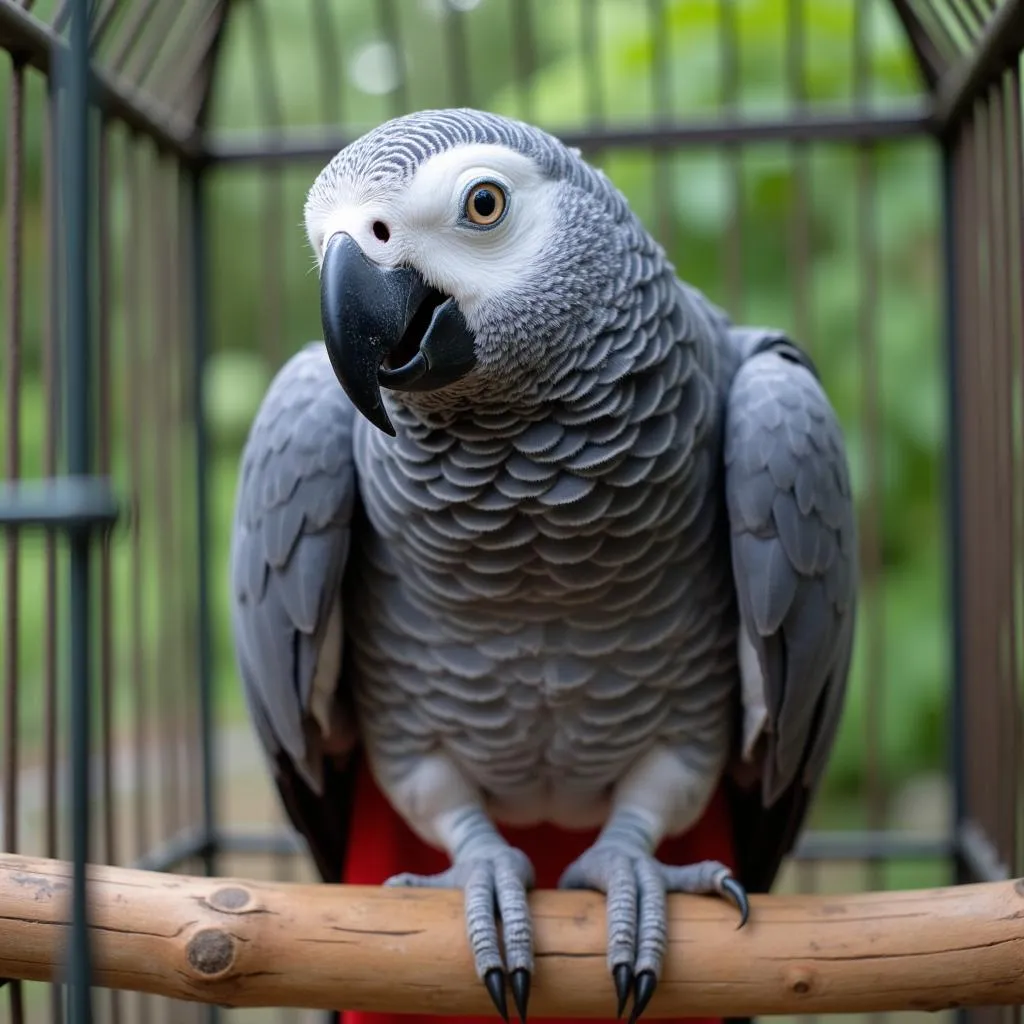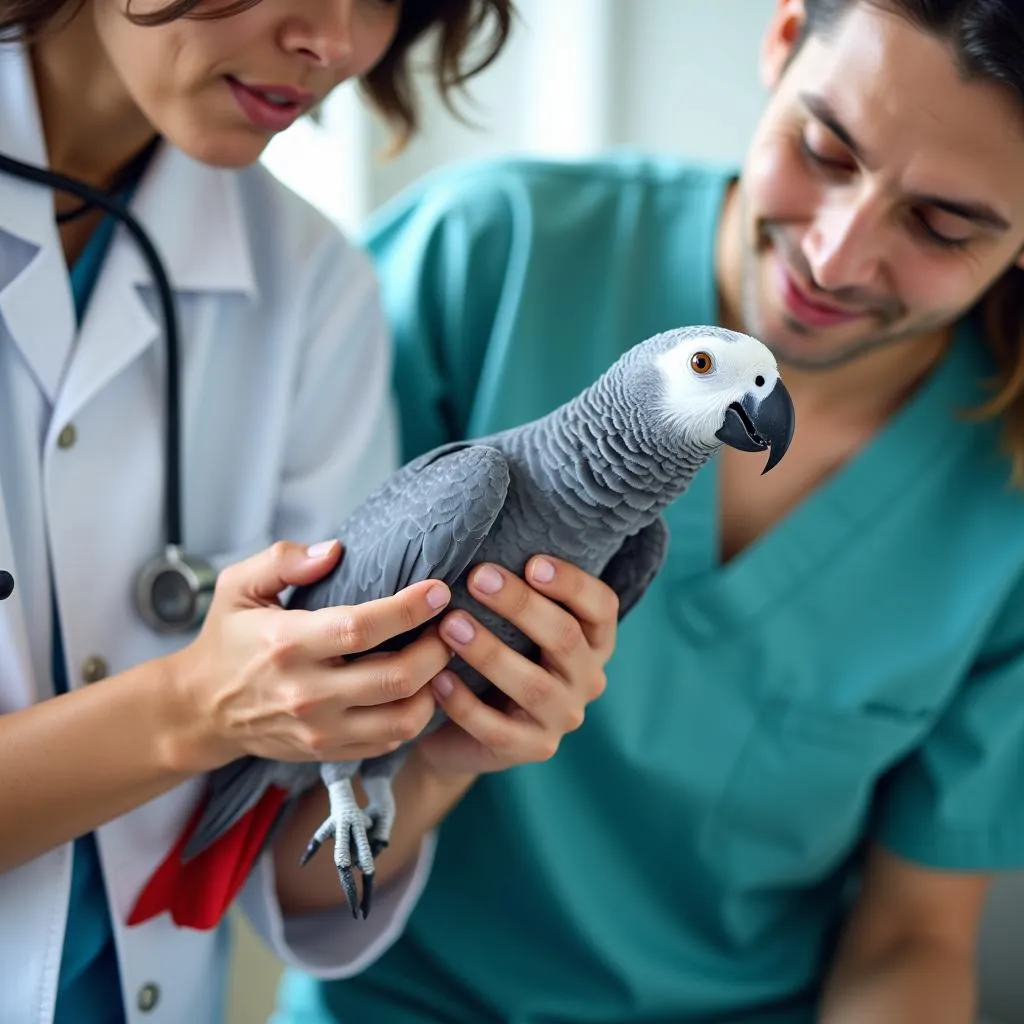Recognizing African Grey Liver Disease Symptoms
African grey parrots, known for their intelligence and talking abilities, are susceptible to various health problems. Among these, African grey liver disease is a serious concern that requires immediate attention from bird owners. This article delves into the symptoms, causes, and treatment options for liver disease in African greys, empowering you to provide the best possible care for your feathered companion.
Understanding the Liver’s Role
The liver plays a vital role in an African grey’s overall health, similar to its function in humans. It filters toxins from the blood, aids in digestion, and produces essential proteins. When the liver is compromised, it can lead to a range of health issues that can be life-threatening if left untreated.
Common African Grey Liver Disease Symptoms
Recognizing the symptoms of liver disease early is crucial for successful treatment. Here are some common signs to be aware of:
- Changes in Droppings: Healthy African grey droppings have distinct fecal and urine components. Liver disease can cause changes in color, consistency, and frequency. Look for excessively watery droppings, dark green or black feces, and an increase in urates.
- Loss of Appetite and Weight Loss: A sudden decrease in appetite or a gradual decline in food intake accompanied by noticeable weight loss can be a strong indicator of liver problems.
- Lethargy and Weakness: Birds with liver disease often exhibit decreased activity levels, spending more time at the bottom of the cage and showing little interest in their surroundings.
- Feather Plucking and Skin Problems: Itching, feather plucking, and skin lesions can be signs of liver disease, often attributed to toxins accumulating in the bloodstream.
- Swollen Abdomen: An enlarged liver can press on the surrounding organs, leading to a visibly swollen abdomen.
- Neurological Issues: In advanced stages, liver disease can cause neurological symptoms such as head tremors, seizures, and loss of coordination.
 African Grey Showing Lethargy in Cage
African Grey Showing Lethargy in Cage
Causes of Liver Disease in African Greys
Several factors can contribute to liver disease in African greys, including:
- Infections: Bacterial, viral, and fungal infections can affect the liver.
- Nutritional Deficiencies: A diet lacking essential vitamins and minerals, particularly vitamin A and selenium, can predispose birds to liver disease.
- Obesity: Overweight African greys are at a higher risk of developing fatty liver disease.
- Toxins: Exposure to heavy metals, pesticides, and certain household chemicals can damage the liver.
- Genetics: Some African greys may have a genetic predisposition to liver problems.
Diagnosing African Grey Liver Disease
If you suspect your African grey is showing signs of liver disease, it’s crucial to seek veterinary care immediately. A veterinarian specializing in avian medicine will conduct a thorough examination and recommend diagnostic tests such as:
- Blood Tests: These tests can reveal elevated liver enzymes, indicating liver damage.
- X-rays and Ultrasound: Imaging tests can help visualize the liver and identify any abnormalities in size, shape, or structure.
- Biopsy: In some cases, a small liver tissue sample may be collected for microscopic examination to determine the underlying cause of the disease.
Treatment Options for Liver Disease
Treatment for African grey liver disease depends on the underlying cause and the severity of the condition. It typically involves a multifaceted approach that may include:
- Medications: Antibiotics, antifungals, or antiviral medications may be prescribed to address infections.
- Dietary Changes: Switching to a balanced, formulated diet specifically designed for African greys is crucial. Your veterinarian may also recommend supplements to address any nutritional deficiencies.
- Fluid Therapy: Intravenous or subcutaneous fluids may be administered to prevent dehydration and support organ function.
- Environmental Management: Minimizing exposure to potential toxins in the bird’s environment is essential.
- Supportive Care: Providing a stress-free environment, maintaining a comfortable temperature, and ensuring adequate rest are vital for recovery.
 Veterinarian Examining African Grey Parrot
Veterinarian Examining African Grey Parrot
Preventing Liver Disease in African Greys
Prevention is key to protecting your African grey from liver disease. Here are some preventative measures:
- Provide a Nutritious Diet: Feed a high-quality, pelleted diet formulated for African greys. Supplement with fresh fruits, vegetables, and healthy treats in moderation.
- Maintain a Healthy Weight: Monitor your bird’s weight regularly and adjust food intake accordingly to prevent obesity.
- Schedule Regular Veterinary Checkups: Routine checkups allow your veterinarian to detect early signs of health problems, including liver disease.
- Ensure a Safe Environment: Avoid exposing your bird to potential toxins such as cigarette smoke, cleaning products, and pesticides.
- Practice Good Hygiene: Clean your bird’s cage, food and water dishes regularly to prevent bacterial growth.
Living with an African Grey with Liver Disease
Managing liver disease in African greys requires ongoing commitment from owners. Regular veterinary visits are crucial for monitoring the bird’s condition and making necessary adjustments to the treatment plan. With proper care and attention, many African greys with liver disease can live relatively long and happy lives.
FAQs about African Grey Liver Disease
Can liver disease in African greys be cured?
The prognosis for African grey liver disease depends on the underlying cause and the extent of liver damage. Some causes, such as infections, can be treated effectively with early intervention. However, chronic liver disease may require lifelong management.
What is the life expectancy of an African grey with liver disease?
With proper care, an African grey with liver disease can live several years. However, early diagnosis and treatment are crucial for improving the prognosis.
Is liver disease in African greys contagious to humans?
No, liver disease in African greys is not contagious to humans. However, it’s essential to practice good hygiene when handling birds, as they can carry other diseases that may be transmissible to humans.
 Healthy African Grey Enjoying Fresh Fruits
Healthy African Grey Enjoying Fresh Fruits
Seeking Further Assistance
If you have any concerns about your African Grey’s health or suspect they might be exhibiting symptoms of liver disease, please do not hesitate to reach out for help. You can contact us at the following:
Phone Number: +255768904061
Email: kaka.mag@gmail.com
Address: Mbarali DC Mawindi, Kangaga, Tanzania.
Our dedicated customer support team is available 24/7 to assist you.
For more information on African Grey parrot care, you can explore these related articles:
Remember, early detection and intervention are vital for managing African grey liver disease effectively. By being informed and proactive, you can help your feathered friend live a long and healthy life.



